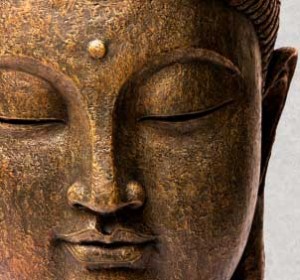
The Dhammapada begins with conjugate verses; here is the first one:
In all things the primordial element is mind. Mind predominates. Everything proceeds from mind.
Naturally, this concerns the physical life, there is no question of the universe.
If a man speaks or acts with an evil mind, suffering follows him as the wheel follows the hoof of the bullock that pulls the cart.
That is to say, ordinary human life, such as it is in the present world, is ruled by the mind; therefore the most important thing is to control one’s mind; so we shall follow a graded or “conjugate” discipline, to use the Dhammapada’s expression, in order to develop and control our minds.
There are four movements which are usually consecutive, but which in the end may be simultaneous: to observe one’s thoughts is the first, to watch over one’s thoughts is the second, to control one’s thoughts is the third and to master one’s thoughts is the fourth. To observe, to watch over, to control, to master. All that to get rid of an evil mind, for we are told that the man who acts or speaks with an evil mind is followed by suffering as closely as the wheel follows the hoof of a bullock that ploughs or draws the cart.
**
Mind predominates. Everything proceeds from mind. In all things the primordial element is mind.
If a man speaks or acts with a purified mind, happiness accompanies him as closely as his inseparable shadow.
The Dhammapada contrasts a purified mind with an evil mind. We have already said that there are four successive stages for the purification of the mind. A purified mind is naturally a mind that does not admit any wrong thought, and we have seen that the complete mastery of thought which is required to gain this result is the last achievement in the four stages I have spoken of. The first is: to observe one’s mind.
Do not believe that it is such an easy thing, for to observe your thoughts, you must first of all separate yourself from them. In the ordinary state, the ordinary man does not distinguish himself from his thoughts. He does not even know that he thinks. He thinks by habit. And if he is asked all of a sudden, “What are you thinking of?” he knows nothing about it. That is to say, ninety-five times out of a hundred he will answer, “I do not know.” There is a complete identification between the movement of thought and the consciousness of the being.
To observe the thought, the first movement then is to step back and look at it, to separate yourself from your thoughts so that the movement of the consciousness and that of thought may not be confused. Thus when we say that one must observe one’s thoughts, do not believe that it is so simple; it is the first step.
The Mother





